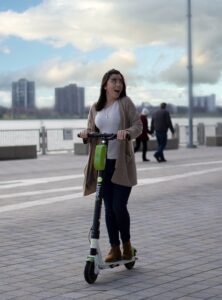 So you’ve just hopped on your new electric scooter, feeling the wind in your hair and the thrill of gliding effortlessly down the street. But wait, are electric scooters even legal? It’s a question that many scooter enthusiasts have found themselves asking, and in this article, we’ll explore the legalities surrounding these convenient and eco-friendly modes of transportation. From where you can ride them to the regulations you need to follow, we’ll help you navigate the legal landscape of electric scooters, ensuring you can ride with confidence and peace of mind.
So you’ve just hopped on your new electric scooter, feeling the wind in your hair and the thrill of gliding effortlessly down the street. But wait, are electric scooters even legal? It’s a question that many scooter enthusiasts have found themselves asking, and in this article, we’ll explore the legalities surrounding these convenient and eco-friendly modes of transportation. From where you can ride them to the regulations you need to follow, we’ll help you navigate the legal landscape of electric scooters, ensuring you can ride with confidence and peace of mind.
Understanding the Legalities of Electric Scooters
Electric scooters have become increasingly popular as a convenient and eco-friendly mode of transportation. However, before zipping around town on your electric scooter, it’s important to understand the legalities surrounding their use. From laws and regulations to safety requirements and licensing, this comprehensive guide will help you navigate the legal landscape of electric scooters.
Laws and Regulations for Electric Scooters
The laws and regulations surrounding electric scooters can vary from one jurisdiction to another. It’s crucial to familiarize yourself with the specific rules in your area to ensure compliance. In some places, electric scooters are classified as motor vehicles, while in others, they may fall under different categories or have their own distinct set of regulations.
Classification of Electric Scooters
Electric scooters are typically classified based on factors such as speed, power, and design. Different classifications may have varying legal requirements or restrictions. For instance, some jurisdictions may have separate rules for low-powered electric scooters that have a top speed below a certain threshold. Understanding the classification of your electric scooter is essential when it comes to complying with the relevant laws.

Safety Requirements for Electric Scooters
Safety should always be a top priority when operating an electric scooter. Many jurisdictions enforce specific safety requirements that electric scooters must meet to ensure rider and pedestrian safety. These requirements may include features such as headlights, taillights, reflectors, brakes, and audible warning devices. Regular maintenance and inspection of your electric scooter will help ensure that it meets these safety standards.
Licensing and Age Requirements
Licensing and age requirements for electric scooter riders vary across different regions. In some areas, a standard driver’s license or motorcycle license may be required, while in others, an additional permit specifically for electric scooters might be necessary. Age restrictions also vary, with some jurisdictions allowing teenagers to ride electric scooters, while others require riders to be at least 18 years old. Familiarize yourself with the licensing and age requirements in your area before operating an electric scooter.

Helmet Laws for Electric Scooters
Just like with bicycles and motorcycles, helmet laws can apply to electric scooters as well. Wearing a helmet is not only a legal requirement in many places but also a crucial safety measure. Even at lower speeds, accidents can happen, and a helmet can greatly reduce the risk of head injuries. Make sure to always wear an approved helmet that fits properly whenever riding an electric scooter.
Rules for Riding Electric Scooters on Public Roads
Electric scooters are typically permitted on public roads, but the specific rules and regulations can vary. In most cases, electric scooters are required to follow the same traffic laws as other motor vehicles. This includes obeying traffic signals, using appropriate hand signals when turning, and yielding right of way to pedestrians. Additionally, some jurisdictions may impose specific speed limits for electric scooters.

Sidewalk Riding Restrictions
While electric scooters are allowed on public roads in many places, riding them on sidewalks can be subject to restrictions. In densely populated areas, riding electric scooters on sidewalks may be prohibited due to safety concerns for pedestrians. Always be mindful of local regulations and respect the rights of pedestrians. If riding on a sidewalk is allowed, make sure to adjust your speed and give pedestrians ample space.
Parking Regulations for Electric Scooters
Parking regulations for electric scooters can vary depending on the area. Some cities have designated parking areas or docking stations specifically for electric scooters, while others require riders to park them in designated spots for bicycles or mopeds. It’s important to familiarize yourself with the parking regulations in your region to avoid fines or having your scooter impounded.

Implications of Riding Under the Influence
Just like with any other motor vehicle, riding an electric scooter under the influence of alcohol or drugs can have severe legal and safety implications. Operating an electric scooter while impaired poses a risk to yourself and others on the road. In many jurisdictions, the same laws that apply to driving under the influence of alcohol or drugs also apply to riding an electric scooter. It’s important to always ride sober to avoid legal consequences and ensure your safety.
Legal Consequences of Violating Electric Scooter Laws
Violating electric scooter laws can lead to various legal consequences, such as fines, citations, or even legal action. Enforcement of these laws has become stricter as electric scooters gain popularity. Ignorance of the law is not a valid excuse, so it’s crucial to familiarize yourself with the specific regulations and abide by them. Failure to comply with the legal requirements can not only result in penalties but also compromise your safety and the safety of others.
In conclusion, understanding the legalities surrounding electric scooters is crucial for safe and responsible riding. Laws and regulations, classifications, safety requirements, licensing, helmet laws, road rules, sidewalk restrictions, parking regulations, riding under the influence, and the legal consequences of violations are all important aspects to be aware of. By familiarizing yourself with these factors, you can ensure a smooth and legal riding experience on your electric scooter. Always prioritize your safety and the safety of others when operating any type of personal electric vehicle.




